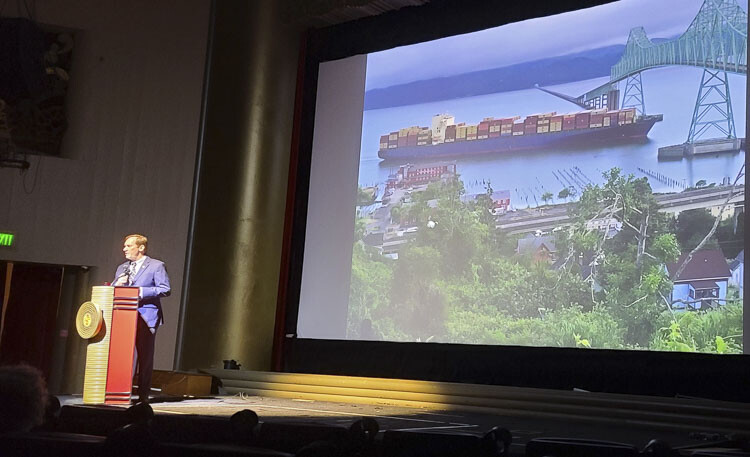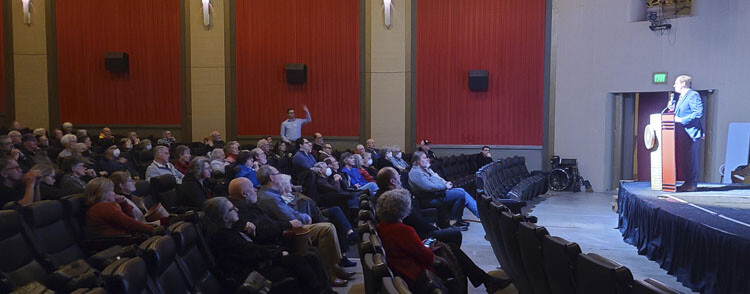
Capt. Dan Jordan talks about the thrills associated with his job, and the importance of safety on the Columbia River
Paul Valencia
ClarkCountyToday.com
The job itself is a thrill ride. A lot of danger. Plenty of adrenaline. And skills that take years to hone.
Heck, just getting to the job is risky.
“Our commute is different,” Capt. Dan Jordan said in the understatement of the night.
Jordan is a Columbia River Bar pilot, one of experts who go aboard incoming and outcoming container ships, grain ships, and others ships to navigate them through the “Graveyard of the Pacific.”
Yes, that is the nickname for the Columbia bar, which has seen more than 2,000 shipwrecks since the 1800s, according to some estimates.
With talented pilots such as Capt. Jordan, though, that is more of a nickname than reality these days.
Jordan and his colleagues reach their work sites either by pilot boat or by helicopter.
Jordan talked about his challenging job and that commute, plus he brought graphics, photos, and videos to Vancouver on Wednesday. He was the keynote speaker for the return of the Port of Vancouer USA Lecture Series.
If Jordan gets to a ship by pilot boat, he then must time his leap onto the pilot ladder hanging on the big ship just as the waves are just right. As soon as he finds himself on the ladder, he must climb to the top as fast as possible before the next wave hits the ship.
When the job is done, the process is reversed.
Or, he could just be lowered, by winch, from a helicopter, flying above the ship.
Oh, and that’s the easy part of his job.

The Columbia River bar pilots navigate the ships from the Pacific Ocean into Astoria, through the Columbia River bar — where everything collides. The river flow is coming out, meeting up with ocean swells and currents. Throw in those Pacific Ocean storms all winter, and, yes, it can become hectic in a hurry.
Danger is everywhere, but for Jordan, it is all relative. He has been a bar pilot on the Columbia River for 18 years. Before that, though, he sailed all over the world.
“There is an element of risk, but years ago, I was carrying ammo to Kuwait,” he said. “So this is a little bit better.”
Plus, a lot of Jordan’s talk Wednesday focused on safety. The pilots, the Coast Guard, weather experts, and the ship captains work together to determine risk factors. Before bringing a ship into Astoria, they ask themselves several questions. One, is it safe for the ship? Two, is it safe for the pilots to get on and off the ship, or the pilot boat? There are a number of factors.
Sometimes, they have to close the bar if it is too dangerous. That causes stress, too, because time is money.
There are occasions in the winter when big storms come in one after the other.
“By the end of winter, we’re looking forward to summer,” Jordan said.
He ended his lecture, though, celebrating the safety record for all involved in the transportation of so much cargo.
“Safe ports don’t happen by accident. We all work together on this river to make sure we have a well functioning river,” he said.
A bar pilot’s job is crucial, and it serves just about everyone — directly or indirectly — living in the Northwest.
“What can you say about bar pilots?” asked Julie Rawls, community relations manager for the Port of Vancouver USA as she introduced Jordan to more than 100 people who showed up for the lecture at Kiggins Theater in downtown Vancouver.
“It’s just one of the most fascinating jobs on the planet,” Rawls continued. “These talented and great pilots ensure international access to Northwest ports and make sure products from the ports get to international customers. They help move 51 million tons of cargo valued at $22 billion each year.”
Jordan’s lecture was fascinating and educational. Exactly the point of these lectures.
The Port of Vancouver USA held similar lectures previously but stopped during the pandemic.
“We’re back, baby,” Rawls said as the crowd cheered.
There will be two more lectures in March, plus the annual port report will likely be held in April.
The lectures came about because port officials were getting so many questions from folks who took tours of the port. There wasn’t enough time to answer everything, so the port came up with the idea for a lecture series. It was successful, and the port was looking forward to the return of the series.
The next lecture is set for 6:30 p.m. March 15, featuring Lori Otto Punke, the president of the Washington Council on International Trade. Rawls noted that Washington is the most trade-dependent state in the country, with 75 port districts. Oregon, by comparison, has 23 port districts. Punke will be discussing “Washington State – International Trade Juggernaut.”
On March 29, Alex Strogen, the port’s chief commercial officer, will preview new initiatives the port is pursuing in “The Marine and Commercial Outlook at the Port of Vancouver USA” talk.
Rawls said that Strogen will also explain how the port goes about finding cargo and trade partners. She said he has an interesting story on how wind blades are coming into the Port of Vancouver for wind farms in Canada.
The lecture series is free to the public. Popcorn, pizza, and other concessions are available for purchase. A percentage of the concession sales will benefit the Fort Vancouver Seafarers Center.
No need to be lowered by a winch from a helicopter to Kiggins Theater. Parking is free downtown after 6 p.m.
Also read:
- Hundreds rally in Olympia against proposed tax increasesHundreds gathered in Olympia on Tax Day to protest a wide range of proposed tax hikes put forward by Democratic lawmakers in Washington state.
- Vancouver City Council urged to adopt seven changes to limit public campingClark County Matters is calling on Vancouver leaders to adopt seven ordinance changes that would limit public camping and address growing concerns about safety and livability.
- On ‘Tax Day,’ Senate Democrats propose billions more in tax increasesOn Tax Day, Washington Senate Democrats introduced new tax proposals totaling $12 billion, contrasting sharply with Senate Republicans’ no-new-taxes ‘$ave Washington’ budget proposal.
- Letter: ‘There will be consequences’Hazel Dell resident Bob Zak criticizes Democratic lawmakers for advancing ESSB 5181, arguing it undermines parental rights and defies biblical principles.
- Clark County Fire District 10 selects local firm to begin planning for replacement of the Amboy Fire StationClark County Fire District 10 has selected Aetta Architecture to begin planning a replacement for the Amboy Fire Station, first built in 1963 and no longer equipped to meet modern emergency response demands.
- Kitten finders, kitten keepers?Nomi Berger shares practical steps for what to do if you find a litter of kittens this spring, including how to assess their needs and connect with Furry Friends in Vancouver.
- PeaceHealth Southwest Medical Center seeks new members for Patient & Family Advisory CouncilPeaceHealth Southwest Medical Center is seeking new members for its Patient & Family Advisory Council to help improve patient care through direct community feedback.











